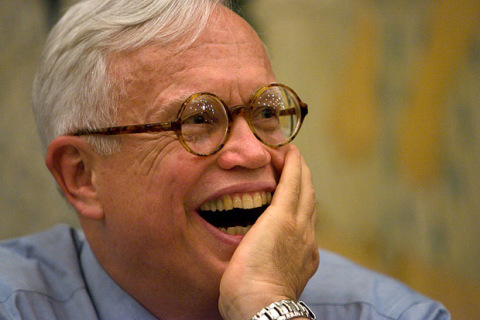The ultimate takedown of teflon-coated defenders of rational expectations James Heckman, winner of the “Nobel Prize” in economics, was inteviewed by John Cassidy in 2010. What about the rational-expectations hypothesis, the other big theory associated with modern Chicago? How does that stack up now? … It became a kind of tautology that had enormously powerful policy implications, in theory. But the fact is, it didn’t have any empirical content. When Tom Sargent, Lard Hansen, and others tried to test it using cross equation restrictions, and so on, the data rejected the theories. There were a certain section of people that really got carried away. It became quite stifling … What about you? When rational expectations was sweeping economics, what was your
Topics:
Lars Pålsson Syll considers the following as important: Economics
This could be interesting, too:
Lars Pålsson Syll writes Schuldenbremse bye bye
Lars Pålsson Syll writes What’s wrong with economics — a primer
Lars Pålsson Syll writes Krigskeynesianismens återkomst
Lars Pålsson Syll writes Finding Eigenvalues and Eigenvectors (student stuff)
The ultimate takedown of teflon-coated defenders of rational expectations

James Heckman, winner of the “Nobel Prize” in economics, was inteviewed by John Cassidy in 2010.
What about the rational-expectations hypothesis, the other big theory associated with modern Chicago? How does that stack up now? …
It became a kind of tautology that had enormously powerful policy implications, in theory. But the fact is, it didn’t have any empirical content. When Tom Sargent, Lard Hansen, and others tried to test it using cross equation restrictions, and so on, the data rejected the theories. There were a certain section of people that really got carried away. It became quite stifling …
What about you? When rational expectations was sweeping economics, what was your reaction to it? I know you are primarily a micro guy, but what did you think?
What struck me was that we knew Keynesian theory was still alive in the banks and on Wall Street. Economists in those areas relied on Keynesian models to make short-run forecasts. It seemed strange to me that they would continue to do this if it had been theoretically proven that these models didn’t work.
What about the efficient-markets hypothesis? Did Chicago economists go too far in promoting that theory, too?
Some did. But there is a lot of diversity here. You can go office to office and get a different view …
So, today, what survives of the Chicago School? What is left? …
When Friedman died, a couple of years ago, we had a symposium for the alumni devoted to the Friedman legacy. I was talking about the permanent income hypothesis; Lucas was talking about rational expectations. We have some bright alums. One woman got up and said, “Look at the evidence on 401k plans and how people misuse them, or don’t use them. Are you really saying that people look ahead and plan ahead rationally?” And Lucas said, “Yes, that’s what the theory of rational expectations says, and that’s part of Friedman’s legacy.” I said, “No, it isn’t. He was much more empirically minded than that.” People took one part of his legacy and forgot the rest. They moved too far away from the data.
Yes indeed, they certainly “moved too far away from the data.”
In one of the more well-known and highly respected evaluation reviews made, Michael Lovell (1986) concluded:
it seems to me that the weight of empirical evidence is sufficiently strong to compel us to suspend belief in the hypothesis of rational expectations, pending the accumulation of additional empirical evidence.
And this is how Nikolay Gertchev summarizes studies on the empirical correctness of the hypothesis:
More recently, it even has been argued that the very conclusions of dynamic models assuming rational expectations are contrary to reality: “the dynamic implications of many of the specifications that assume rational expectations and optimizing behavior are often seriously at odds with the data” (Estrella and Fuhrer 2002, p. 1013). It is hence clear that if taken as an empirical behavioral assumption, the RE hypothesis is plainly false; if considered only as a theoretical tool, it is unfounded and selfcontradictory.
For even more on the issue, permit me to self-indulgently recommend reading my article Rational expectations — a fallacious foundation for macroeconomics in a non-ergodic world in real-world economics review no. 62.
